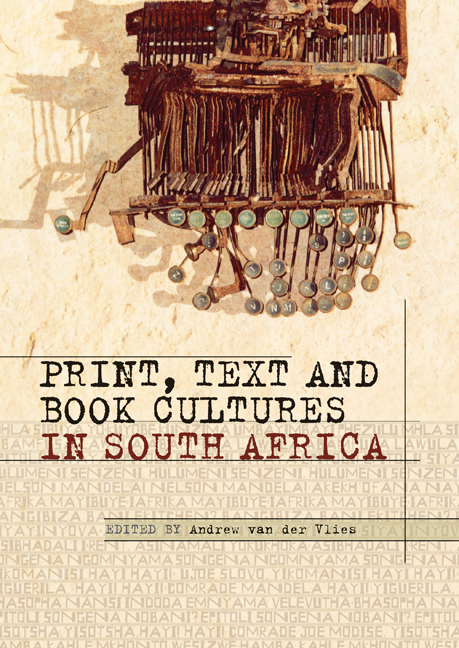Book contents
- Frontmatter
- Contents
- Acknowledgements
- Abbreviations and acronyms
- 1 Introductory
- 1.1 Print, Text and Books in South Africa
- 2 Print Cultures and Colonial Public Spheres
- 3 Local/Global: South African Writing and Global Imaginaries
- 4 Three Ways of Looking at Coetzee
- 5 Questions of the Archive and the Uses of Books
- 6 Orature, Image, Text
- 7 Ideological Exigencies and the Fates of Books
- 8 New Directions
- Contributors
- Index
1.1 Print, Text and Books in South Africa
from 1 - Introductory
Published online by Cambridge University Press: 21 April 2018
- Frontmatter
- Contents
- Acknowledgements
- Abbreviations and acronyms
- 1 Introductory
- 1.1 Print, Text and Books in South Africa
- 2 Print Cultures and Colonial Public Spheres
- 3 Local/Global: South African Writing and Global Imaginaries
- 4 Three Ways of Looking at Coetzee
- 5 Questions of the Archive and the Uses of Books
- 6 Orature, Image, Text
- 7 Ideological Exigencies and the Fates of Books
- 8 New Directions
- Contributors
- Index
Summary
In a late chapter in Boyhood (1998 [1997]), the first of J. M. Coetzee's fictionalised—or autre-biographical—memoirs, the child protagonist, John (who is based on Coetzee, although not entirely congruent with him), has suggestive encounters with two machines. With his mother and brother, John visits his great-aunt Annie in the Volkshospitaal in Cape Town and stays briefly in the old woman's flat in the southern suburbs. Here, in her storeroom, he comes across “the book press”. Persuading his younger brother “to lay his arms in the bed of the press”, John turns the screw so that his brother's “arms are pinned and he cannot escape”, then they reverse roles and, his own arms pinned, John ponders: “One or two more turns … and the bones will be crushed. What is it that makes them forbear, both of them?” (Coetzee 1998, 118–19). Immediately after this episode, John remembers visiting a farm near Worcester some years previously, where the brothers had stumbled on a machine for grinding maize. He recalls that he had coaxed his brother similarly into placing his hand “down the funnel where the mealie-pits were thrown in”, had “turned the handle”, and, momentarily, “before he stopped … could feel the fine bones of the fingers being crushed” (Coetzee 1998, 119).
Coetzee's suggestive linking of the press and the grinder associates technologies of temporal and spiritual sustenance: the grinder produces food; the book press had been used to print multiple copies of a “squat book in a red binding” by his great-grandfather, Annie's father (translated from German into Afrikaans by her), with a portentously spiritual title, “Deur ‘n gevaarlike krankheid tot ewige genesing, Through a Dangerous Malady to Eternal Healing” (Coetzee 1998, 117). The association forged between machines raises the spectre of treachery and cruelty, linking the machinery of the press with an altogether different machine, capable of doing physical harm.
- Type
- Chapter
- Information
- Print, Text and Book Cultures in South Africa , pp. 2 - 48Publisher: Wits University PressPrint publication year: 2012



